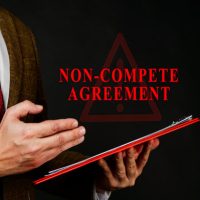New York State set to Ban Non-Competes

New York State will join a growing number of states that have prohibited or restricted Non-Competes.
Key Take Aways of NY Non-Compete Law:
- The Non-Compete Ban has recently been passed by both chambers of the New York State legislature;
- New law will ban non-compete agreements for workers in the State of New York, including New York City;
- The law, if signed by Governor Hochul, will void current non-compete agreements;
- Provides individuals with a cause of action against any entity that seeks to enforce a non-compete agreement or seeks to have individuals enter into a non-compete; and
- Confidentiality and Non-Solicitation Provisions are still permitted, with certain limitations.
On June 20, 2023, the New York Assembly passed a bill that would amend the New York Labor Law banning non-compete agreements and authorizing covered individuals to bring civil actions against those who allegedly violated the new law. The NY Non-Compete Law prohibits non-compete agreements and certain restrictive covenants and authorizes covered individuals to bring a civil action in a court of competent jurisdiction against any employer or persons alleged to have violated such prohibition.
Key Provisions of NY Non-Compete Law:
What is considered a non-compete agreement?
Under the proposed law, a non-compete agreement is defined as:
Any agreement, or clause contained in any agreement, between an employer and a Covered Individual that prohibits or restricts such covered individual from obtaining employment, after the conclusion of employment with the employer included as a party to the agreement.
Under this definition, a non-compete is not just limited to the employer and employee relationship. It expands to any Covered Individual. The proposed NY Non-Compete law defines Covered Individuals as:
Any person who, whether or not employed under a contract of employment, performs work or services for another person on such terms and conditions that they are, in relation to that other person, in a position of economic dependence on, and under an obligation to perform duties for, that other person.
This means that the ban will likely apply to independent contractor relationships as well as traditional employment relationships.
What about non-solicitation agreements and confidentiality agreements?
Whether non-solicitation agreements and confidentiality agreements will be impacted depends on the specific terms of those clauses. For example, non-solicitation agreements usually fall into two categories: non-solicitation of customers and clients; and, non-solicitation of employees. Arguably, prohibiting the solicitation of clients or customers could restrict an individual from obtaining employment. This will most certainly depend on the specifics of the situation and the court’s interpretation of the phrase “restricts such covered individual from obtaining employment.”
On the other hand, confidentiality agreements and the non-solicitation of employees are far less likely to restrict an individual from obtaining employment. Again, the specific circumstances and court interpretation will decide whether the specific confidentiality clause or non-solicitation clause is ultimately in violation of the proposed law.
In fact, the law provides that it does not affect any other provision of law affecting the ability of the employer to enter into an employment contract or other written agreement that protects specifically enumerated legitimate business interests with a prospective or current employee. In other words, an employer may still pursue an individual for stealing trade secrets, proprietary information, customer lists, and property of the employer.
Does the proposed NY law void current non-compete agreements?
Yes. The proposed law states that “every contract by which anyone is restrained from engaging in a lawful profession, trade, or business of any kind is to that extent void.”
Some law firms have written articles that state the law does not void current agreements. In support of this position, those firms have cited the provision in the proposed law that states “This act shall take effect on the thirtieth day after it shall have become a law and shall apply to contracts entered into or modified on or after such effective date.” This provision, however, applies to enforcing the civil penalty (see below) against employers. In the summary section of the proposed act, it specifically states that the act “Voids current non-compete agreements and prohibits employers from seeking such agreement.” Therefore, current non-competes will become void and unenforceable under the proposed law.
What are the penalties for employers who try to enforce non-competes?
For employers that have individuals sign non-competes after the law goes into effect or employers that try to enforce prior non-competes after the law goes into effect, the court “shall have jurisdiction to void a non-compete agreement and to order all appropriate relief.” In addition to “all appropriate relief” the proposed law states that employers will be liable to the individual for “liquidated damages”. Liquidated damages will be no more than $10,000 and are required to be awarded to every affected employee.
When will the proposed New York Non-Compete law go into effect?
This will depend on when Governor Hochul signs the bill. As of June 20, 2023, it has passed both chambers of the NY legislature and is making its way to the Governor’s desk. After Governor Hochul signs the bill, it will become effective 30 days after the date it is signed into law. For now, this question depends on when Governor Hochul signs the bill into law.
What is the statute of limitations for the NY Non-Compete Law?
2 Years. Once the proposed law goes into effect, individuals will have two (2) years to bring an action from the latter of:
- when the prohibited non-compete agreement was signed;
- when the employee learns of the prohibited non-compete agreement;
- when the employment relationship is terminated; or
- when the employer takes any steps to enforce the non-compete agreement.
What to do if you have questions on NY Non-Compete or Non-Solicitation Agreements?
Call Mansell Law at 646-921-8900. We will help you navigate the current state of the law and make sure you are aware of all your rights related to non-competes, non-solicitations, and other restricted covenants. We are experienced, non-compete lawyers.
